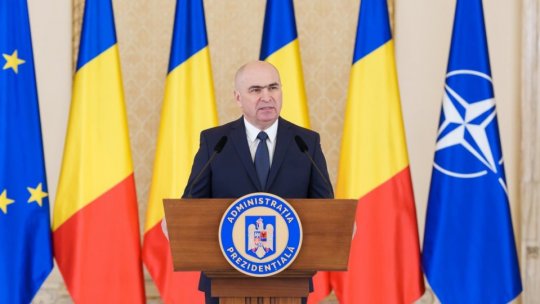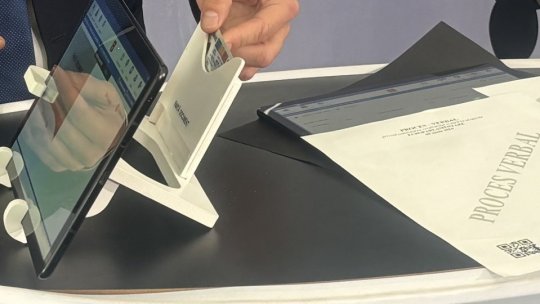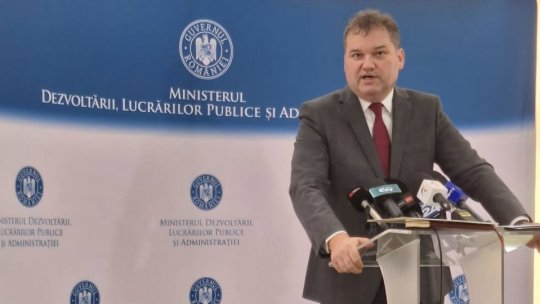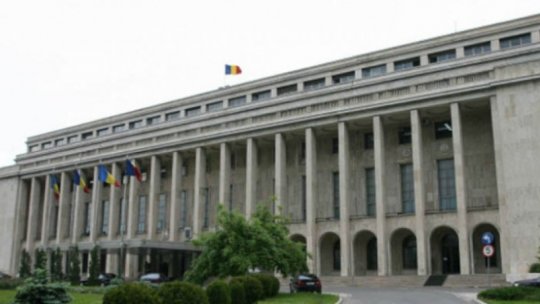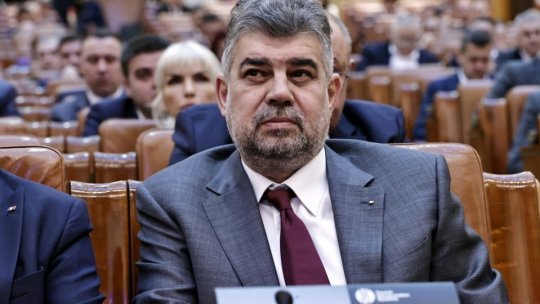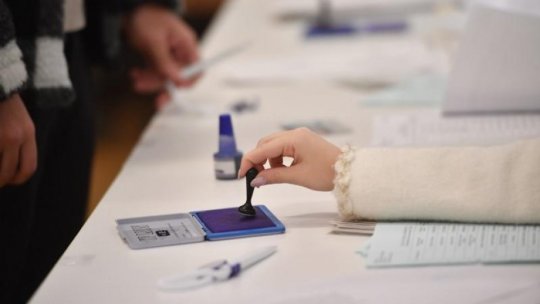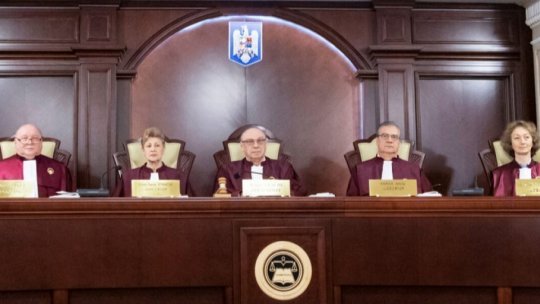Ursula von der Leyen presents portfolios of designated EU Commissioners
European Parliament has to give its consent to the entire College of Commissioners.
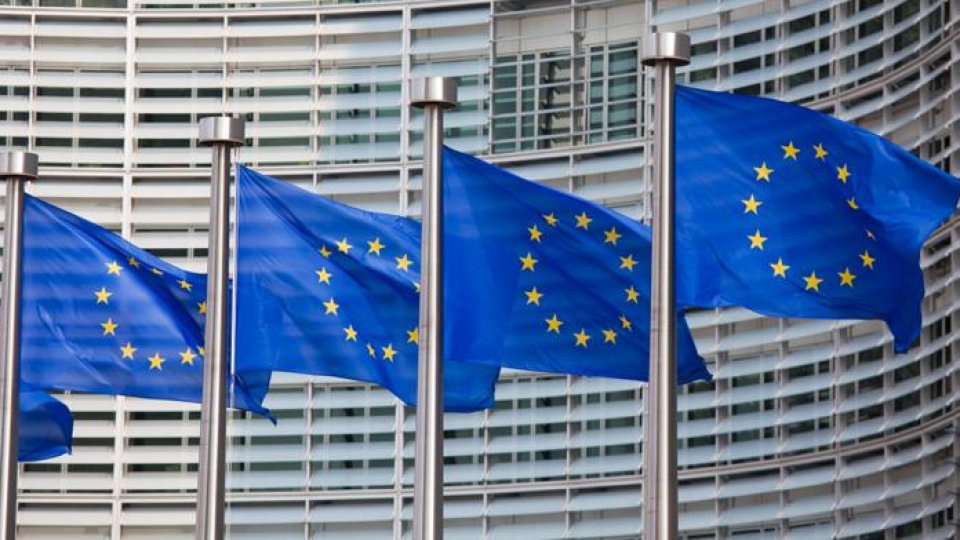
Articol de Miruna Matei, 10 Septembrie 2019, 19:03
President-elect of the European Commission, Ursula von der Leyen, has presented, on Tuesday, her team, the new structure of the next European Commission and the portfolios of the designated EU Commissioners.
President-elect Ursula von der Leyen:"This team will shape the European Way: we will take bold action against climate change, build our partnership with the United States, define our relations with a more self-assertive China and be a reliable neighbor, for example to Africa. This team will have to stand up for our values and world-class standards. I want a Commission that is led with determination, that is clearly focused on the issues at hand and that provides answers. I want it to be a well-balanced, agile and modern Commission. This team will now have to gain the Parliament's confidence. My Commission will be a geopolitical Commission committed to sustainable policies. And I want the European Union to be the guardian of multilateralism. Because we know that we are stronger by doing together what we cannot do alone."
The new College will have eight Vice-Presidents, including the High-Representative of the Union for Foreign Policy and Security Policy (Josep Borrell). The Vice-Presidents are responsible for the top priorities in the Political Guidelines. They will steer Commission’s work on the most important overarching issues, such as the European Green Deal, a Europe fit for the digital age, an economy that works for people, protecting the European way of life, a stronger Europe in the world and a new push for European democracy. The Commissioners are at the center of the structure of the new College. They will manage the expertise provided by the Directorates-General.
Three Executive Vice-Presidents will have a double function. They will be both Vice-President responsible for one of three core topics of the President-elect's agenda and Commissioners.
Executive Vice-President Frans Timmermans (Netherlands) will coordinate the work on the European Green Deal. He will also manage climate action policy, supported by Directorate-General for Climate Action.
Executive Vice-President Margrethe Vestager (Denmark) will coordinate whole agenda on a Europe fit for the digital age and be Commissioner for Competition, supported by Directorate-General for Competition.
Executive Vice-President Valdis Dombrovskis (Latvia) will coordinate the work on an Economy that Works for People and be Commissioner for financial services, supported by Directorate-General for Financial Stability, Financial Services and Capital Markets Union.
The five other Vice-Presidents are:
Josep Borrell (Spain, current Spanish Foreign Minister): HR/VP-designate, A Stronger Europe in the World;
Věra Jourová (Czech Republic, Commissioner in the Juncker Commission): Values and Transparency;
Margaritis Schinas (Greece, former Member of the European Parliament, long-serving official of the European Commission):Protecting our European Way of Life;
Maroš Šefčovič (Slovakia, Vice-President in the Juncker Commission): Interinstitutional Relations and Foresight;
Dubravka Šuica (Croatia, Member of the European Parliament): Democracy and Demography. Dubravka Šuica will also lead, from the Commission side, the work on the Conference on the Future of Europe.
President-elect von der Leyen wants to preside over a College that is committed, that understands Europe and that listens to what Europeans want.
• All members of the College will visit every Member State in the first half of their mandate. They should not only get to know the capitals, but also visit the regions in which the people of Europe live and work.
• Just as Europe must become fit for the digital age, so must the Commission. College meetings will be paperless and digital.
• Goal of the new Commission is to make life easier for people and businesses. When the Commission creates new laws and regulations, it will apply the ‘One-in, one-out' principle to cut red tape.
The other Commissioners-designate are as follows:
Johannes Hahn (Austria) will be in charge of ‘Budget and Administration', and will report directly to Commission President Ursula von der Leyen. As a long-serving member of the College, he knows about the importance of nurturing a modern administration.
Didier Reynders (Belgium), who trained as a lawyer, is a highly experienced former national Finance Minister, Minister for Foreign and European Affairs and Minister of Defense. In the new Commission, he will be responsible for ‘Justice' (including the topic of the rule of law).
Mariya Gabriel (Bulgaria) is a current European Commissioner. She worked with dedication and energy on the digital portfolio, and is now moving on to create new perspectives for the young generation (‘Innovation and Youth' portfolio).
Stella Kyriakides (Cyprus) is a medical psychologist with many years of experience in the field of social affairs, health and cancer prevention. She will lead the ‘Health' portfolio.
Kadri Simson (Estonia) is a long-serving member of the Estonian parliament and Minister for Economic Affairs and Infrastructure. She will be in charge of the ‘Energy' portfolio.
Jutta Urpilainen (Finland) was not only Finance Minister and a long-standing member of the Finnish Parliament's Foreign Affairs Committee; she has also worked as a special envoy in Ethiopia. She will take over responsibility for ‘International Partnerships'.
Sylvie Goulard (France), former Member of European Parliament, is a dedicated and convinced European. As the ‘Internal Market' Commissioner, she will lead our work on industrial policy and promote the Digital Single Market. She will also be responsible for the new Directorate-General for Defense Industry and Space.
László Trócsányi (Hungary) is the former Minister of Justice of Hungary. He will lead the ‘Neighborhood and Enlargement' portfolio.
Phil Hogan (Ireland), the incumbent Commissioner for Agriculture, will bring his experience to the new Commission in the ‘Trade' portfolio.
Paolo Gentiloni (Italy), former Italian Prime Minister and Minister of Foreign Affairs, will be sharing his vast experience in the ‘Economy' portfolio.
Virginijus Sinkevičius (Lithuania), Lithuanian Minister for Economy and Innovation, will be responsible for ‘Environment and Oceans'.
Nicolas Schmit (Luxembourg) is bringing his experience from the European Parliament and his service as national Minister for Employment and Labour, and will now be responsible for the ‘Jobs' portfolio.
Helena Dalli (Malta) has dedicated her political life to equality, serving as Minister for Social Dialogue, Consumer Affairs and Civil Liberties, and also as a Minister for European Affairs and Equality. She will lead the ‘Equality' portfolio.
Janusz Wojciechowski (Poland) was a long-serving Member of the European Parliament in the Agriculture Committee, and is currently a Member of the European Court of Auditors. He will be in charge of the portfolio ‘Agriculture'.
Elisa Ferreira (Portugal) is currently Vice-Governor of Banco de Portugal. She has been a Member of the European Parliament for many years, and was the Portuguese Minister for Planning and Minister for Environment. She will lead the ‘Cohesion and Reforms' portfolio.
Rovana Plumb (Romania) is a Member of the European Parliament (Vice-President of the Social and Democrats Group), and is a former national Minister of Environment and Climate Change, Minister of Labour, Minister of European Funds, Minister of Education and Minister of Transport. She will be in charge of the ‘Transport' portfolio.
Janez Lenarčič (Slovenia) is a Slovenian diplomat. He was Secretary of State for European Affairs, and worked closely for several years with the United Nations, the Organization for Security and Cooperation in Europe and the European Union. He will be in charge of the ‘Crisis Management' portfolio.
Ylva Johansson (Sweden) is national Minister for Employment but also a former Minister for Schools and Minister for Health and Elderly Care and member of Swedish Parliament. She is also a highly respected expert in the fields of employment, integration, health and welfare. She will lead the ‘Home Affairs' portfolio.
Next steps
As a next step, the European Parliament has to give its consent to the entire College of Commissioners, including the High Representative of the Union for Foreign Affairs and Security Policy/Vice-President of the European Commission.This is preceded by hearings of the Commissioners-designate in the relevant Parliamentary committees, in line with Parliament's Rules of Procedure. Once the European Parliament has given its consent, the European Council formally appoints the European Commission.
Source:European Commission


